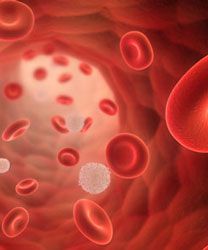Daratumumab Submitted for Frontline Approval in Myeloma
Daratumumab (Darzalex) has been submitted for FDA approval for use in combination with bortezomib (Velcade), melphalan and prednisone (VMP) for the treatment of patients with newly diagnosed multiple myeloma who are ineligible for autologous stem cell transplantation (ASCT).
multiple myeloma

Daratumumab (Darzalex) has been submitted for FDA approval for use in combination with bortezomib (Velcade), melphalan and prednisone (VMP) for the treatment of patients with newly diagnosed multiple myeloma who are ineligible for autologous stem cell transplantation (ASCT).
The supplemental biologics license application (sBLA) is based on data from the phase III ALCYONE trial (MMY3007; NCT02195479), results of which will be reported at 2017 ASH Annual Meeting, according to Genmab, which codevelops the CD38-targeted monoclonal antibody daratumumab with Janssen. The trial compared daratumumab plus VMP versus VMP alone in frontline multiple myeloma. The ALCYONE data have also been submitted to the European Medicines Agency.
The randomized, open-label, multicenter ALCYONE study included 706 newly diagnosed patients with multiple myeloma who were ineligible for ASCT. Patients received 9 cycles of VMP alone or combined with daratumumab.
Daratumumab was administered at 16 mg/kg once weekly for 6 weeks (cycle 1; 1 cycle = 42 days), followed by once every 3 weeks (cycles 2-9). After completing the 9 cycles, patients in the daratumumab cohort continued daratumumab at 16 mg/kg once every 4 weeks until progression. Progression-free survival (PFS) was the primary endpoint of the trial.
Daratumumab was first approved by the FDA in November 2015 as a monotherapy for patients with multiple myeloma following at least 3 prior therapies, based on data from 2 open-label clinical trials. In the phase II MMY2002 study, daratumumab demonstrated a 65% one-year overall survival (OS) rate and a 29.2% objective response rate (ORR).1In the phase I/II GEN501 study, the ORR was 36%, median PFS was 5.6 months (95% CI, 4.2-8.1), and the 1-year OS rate was 77% (95% CI, 58-88).2
In November 2016, the FDA approved daratumumab in combination with lenalidomide (Revlimid) and dexamethasone or bortezomib and dexamethasone for patients with relapsed multiple myeloma following at least 1 prior therapy, based on findings from the phase III POLLUX and CASTOR studies.3,4
In the POLLUX trial, adding daratumumab to lenalidomide and dexamethasone reduced the risk of progression or death by 63% versus lenalidomide and dexamethasone for patients with relapsed/refractory multiple myeloma. In the CASTOR trial, the addition of daratumumab to bortezomib and dexamethasone reduced the risk of progression or death by 61% compared with the 2 drugs alone for patients with recurrent or refractory multiple myeloma.
In June 2017, the FDA approved daratumumab for use in combination with pomalidomide (Pomalyst) and dexamethasone for patients with multiple myeloma who have received at least 2 prior therapies, including a proteasome inhibitor and lenalidomide. The approval was based on data from the phase I EQUULEUS (MMY1001) trial, in which the ORR was 59% (95% CI, 49.1%-68.8%) with the daratumumab triplet in patients with relapsed/refractory myeloma.
References:
- Lonial S, Weiss BM, Usmani SZ, et al. Phase II study of daratumumab (DARA) monotherapy in patients with ≥3 lines of prior therapy or double refractory multiple myeloma (MM): 54767414MMY2002 (Sirius). J Clin Oncol. 2015;33 (suppl; abstr LBA8512).
- Lokhorst HM, Plesner T, Laubach JP, et al. Targeting CD38 with Daratumumab Monotherapy in Multiple Myeloma [published online August 26, 2015]. N Engl J Med. doi: 10.1056/NEJMoa1506348.
- Lokhorst HM, Plesner T, Laubach JP, et al. Targeting CD38 with Daratumumab Monotherapy in Multiple Myeloma [published online August 26, 2015]. N Engl J Med. doi: 10.1056/NEJMoa1506348.
- Dimopoulos MA, Oriol A, Nahi H, et al. Daratumumab, lenalidomide, and dexamethasone for multiple myeloma. N Engl J Med. 2016;375(14):1319-1331.
- Palumbo A, Chanan-Khan A, Weisel K, et al. Daratumumab, bortezomib, and dexamethasone for multiple myeloma. N Engl J Med. 2016;375(8):754-766.
- Genmab Announces U.S. FDA Approval of DARZALEX® (daratumumab) in Combination with Pomalidomide and Dexamethasone for Relapsed or Refractory Multiple Myeloma. Genmab. http://ir.genmab.com/releasedetail.cfm?ReleaseID=1030508. Accessed November 21, 2017.